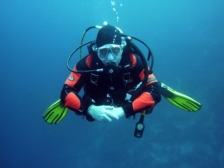 So, a woman walks into a yoga studio to ask about their classes. She sees a class in progress and asks the administrator who it was for. The administrator smiles confidently, and answers:
So, a woman walks into a yoga studio to ask about their classes. She sees a class in progress and asks the administrator who it was for. The administrator smiles confidently, and answers:
“It’s a divers’ group.”
The woman is confused.
“Divers?” she asks. She also wonders how many divers there could be in the town? And why would divers be so interested in yoga?
“Why divers?” she asks.
“Because this class is for anyone,” she says. “We have specialized classes for specific groups — but this one is divers.”
That’s when the woman catches on, and realizes the misunderstanding.
“Oh,” she thinks to herself. “A diverse group. Of course!”
___________________________
Explanation — This is an issue of syllable stress. The word DIVERS is stressed on the first syllable whereas the word DIVERSE is stressed on the second syllable.

This really drives home the importance of syllable stress. It just reminds me of one incident. This man kept saying sending a massage while he meant sending a message. I took it as his accent and translated massage into message in my head during that conversation. And I still don’t know his version of massage. Appreciate your message!
Thanks, Alex. A lot of humour comes from incorrect stress and intonation. Another one I heard recently was “diverse city” but they really meant “diversity.” The first has two stresses (diVERSE CIty) and the second only one (diVERsity.) It’s a subtle difference. We also make this mistake with “can” and can’t”. Generally we don’t stress “can” but we always stress negatives, so the word “can” gets reduced, meaning the vowel sounds more like that in “could” whereas “can’t” gets the full vowel and a beat. So it sounds like this: “I can HELP you” vs. “I CAN’T HELP you.”